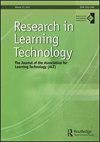The impact of online learning technology on self-regulation and student success
IF 1.2
Q2 EDUCATION & EDUCATIONAL RESEARCH
引用次数: 2
Abstract
The research purpose is to analyse the self-regulation of students who use the massive open online course (MOOC) technology to learn the exact sciences. The sample included 252 students: females were 47%, and males were 53%. The average age of students was 20.08 ± 0.72. The students were divided into two groups: group 1 consisted of students who learnt the Digital singular (nano) optics course online using the MicrosoftTeams platform with teacher’s support; group 2 consisted of students who learnt the MOOC course individually. The relationships between self-regulation and academic success were also analysed. The research found that the overall level of self-regulation of students using MOOCs was 40% higher. In students who learnt online using the MicrosoftTeams, the level of self-regulation was average and amounted to 24.96 ± 1.32. In students who learnt the course based on the MOOC technology, the level of self-regulation was high and amounted to 35.02 ± 1.44 (p < 0.05). The research of self-regulation shows higher results among the students who learnt using MOOCs platforms: flexibility – 46%, planning – 23% and results assessment – 15%; modelling and programming were no different. The average success score of students after learning the course on the MicrosoftTeams platform was 3.83 ± 0.36, and in the MOOC group, it was 4.43 ± 1.89.在线学习技术对自我调节和学生成功的影响
本研究的目的是分析利用大规模开放网络课程(MOOC)技术学习精确科学的学生的自我调节。样本包括252名学生:女性占47%,男性占53%。学生平均年龄为20.08±0.72岁。学生被分为两组:第一组学生在老师的帮助下使用MicrosoftTeams平台在线学习数字奇异(纳米)光学课程;第二组由单独学习MOOC课程的学生组成。本文还分析了自我调节与学业成功的关系。研究发现,使用mooc的学生的整体自我调节水平高出40%。使用MicrosoftTeams在线学习的学生自我调节水平一般,为24.96±1.32。使用MOOC技术学习课程的学生自我调节水平较高,为35.02±1.44 (p < 0.05)。自我调节的研究显示,使用mooc平台学习的学生取得了更高的成绩:灵活性占46%,计划性占23%,结果评估占15%;建模和编程没有什么不同。学生在MicrosoftTeams平台学习课程后的平均成功分数为3.83±0.36,MOOC组的平均成功分数为4.43±1.89。
本文章由计算机程序翻译,如有差异,请以英文原文为准。
求助全文
约1分钟内获得全文
求助全文
来源期刊

Research in Learning Technology
EDUCATION & EDUCATIONAL RESEARCH-
CiteScore
6.50
自引率
0.00%
发文量
13
审稿时长
20 weeks
 求助内容:
求助内容: 应助结果提醒方式:
应助结果提醒方式:


